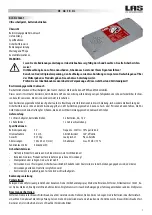
Chapter 5. Ethernet Global Data
74
PACSystems* RX7i & RX3i TCP/IP Ethernet Communications User Manual
GFK-2224Q
Each device in a group responds to the group’s assigned ID number from 1 to 32.
Note:
Each device on the network using EGD should have a unique local producer ID. If the
devices using multicast EGD do not have unique local producer IDs, unexpected results
can occur when using group addressing for EGD exchanges.
Each Group ID corresponds to a Multicast (Class D) IP address reserved by the Internet authorities. The default
Multicast IP addresses used by Ethernet Global Data are:
Group ID
IP Address
Note
1
2
.
.
.
32
224.0.7.1
224.0.7.2
.
.
.
224.0.7.32
For EGD class1 on Embedded
Ethernet Interface of
CPE305/CPE310, Multicast
network can include only up
to 31 numbered groups.
CPE330 & CPE400 Embedded
Ethernet Interface supports
Multicast groups 1 – 32.
Note:
CPE330 and CPE400 do not support AUP file. All of the configurable AUP parameters for
these CPUs are part of the hardware configuration for the corresponding Embedded
Ethernet interface in PME.
Group Multicast IP Addresses used by Ethernet Global Data should not be changed unless the defaults would
cause a network conflict. If necessary, they can be changed within the reserved range of multicast IP
addresses (224.0.0.0 through 239.255.255.255). The change must be made using an Advanced User Parameter
File.
Broadcasting Ethernet Global Data
The same Ethernet Global Data exchange can be sent to all of the consumers on a subnet by configuring the
Produced Exchange to use a Destination Type of ”Broadcast”. The “Destination” of that exchange then changes
to the value 255.255.255.255. (The Ethernet Interface converts this value to the appropriate subnet broadcast
mask for this network.) As with a Group ID, each consumer on the subnet can be configured to use some or all
of the exchange.
Changing Group ID in Run Mode
With the ability to perform a run-mode store of EGD, it is possible to change the Group ID or Destination Type of
a produced or consumed exchange at run-time. The effects of such changes will depend upon the
configurations of the local PLC
and
other devices on your network.
Broadcast
Changing the Destination Type of a produced exchange from unicast or multicast to broadcast causes samples
to be sent to all nodes on your network. Samples are subsequently processed if the local device has a
consumed exchange configured with matching Producer ID and Exchange ID. Otherwise they are ignored.
Multicast
Changing the Destination Type of a produced exchange from unicast or broadcast to multicast causes samples
to be sent to a subset of the nodes on your network. Samples are visible to all devices on the network that
have
any
exchange(s) configured to consume from the specified Group ID. Samples are subsequently
processed only if the local device has a consumed exchange configured with matching Producer ID and
Exchange ID.
This means that modifying a multicast exchange so that it produces to a different Group ID may or may not
affect its consumption. If the remote device has any exchanges configured to consume from the new producer
ID, consumption will not be interrupted. However, consumption will be affected if the remote device is not
configured to consume any exchanges from the new Group ID. In the latter case, updates to the consumed
exchange configuration will be necessary to resume consumption.
Summary of Contents for PACSystems RX7i
Page 45: ......
Page 80: ...Chapter 4 Configuration GFK 2224Q January 2017 67 ...
Page 81: ......
Page 122: ...Chapter 6 Programming EGD Commands GFK 2224Q January 2017 109 ...
Page 147: ......
Page 211: ......
Page 262: ...Chapter 13 Network Administration GFK 2224Q January 2017 249 ...
Page 263: ......
















































